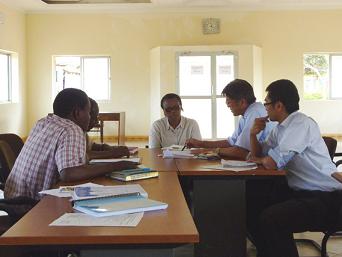Interview【JICA-RI Focus Vol.12】 Interview with Senior Research Fellow Mitsuaki Furukawa
2011.04.08

JICA-RI Senior Research Fellow Mitsuaki Furukawa leads the research project “Significances and Limitations of Budget Support in Development Assistance Regimes" (provisional title) which will be officially launched in fiscal 2011 following the preparatory phase. In this interview, he talks about the background and purpose as well as the expected outcomes of this research.
What is budget support, and why is it attracting attention?
Budget support is an aid approach in which funds are directly delivered to developing countries' budgets, based on a strategy agreed between them and their donors. It is roughly divided into two types: 1) sector budget support: development assistance funds designated to support specific sectors, such as agriculture, education and transportation, and 2) general budget support: funds used for any sector. The budget support approach doesn't limit funds to be used for particular projects but collectively manages development funds from donors as part of a government budget in a recipient developing country. It boosts ownership, administrative capacity, and predictability as well as cuts down transaction costs. Thereby, in recent years, donors such as the U.K., Northern European countries, the World Bank, and EU have been putting effort into this approach as a new aid modality that promotes aid effectiveness.
There have been doubts on project-oriented aid and that contributed to the emergence of budget support approach. In the 1990s, a number of factors including the end of the Cold War, donor fatigue in aid provision, and disappointments in structural adjustment programs prompted discussions over aid effectiveness within the international community. Even when positive effects are gained from individual projects, its continuousness and contributions to the state and development issues are limited, and this is especially seen in Africa. On top of this, various donors play by their own rules and are known to put heavy administrative burdens on aid recipient governments.
Moreover, there have been intense discussions over aid strategies amidst recent diversification of development issues and advancing globalization. A major achievement out of this is the Millennium Development Goals (MDGs) adopted by the United Nations in September, 2000. It is no exaggeration to say that the international community today centers its actions on these goals.
In order to achieve the MDGs, developing countries and donors are working together to prepare Poverty Reduction Strategy Papers (PRSP). In here, general budget support is positioned as an effective tool in materializing PRSP. In March, 2005, the "Paris Declaration on Aid Effectiveness" was adopted at the high level forum on aid effectiveness organized by the OECD's Development Assistance Committee (DAC). The Paris Declaration outlined that donors "must utilize the public finance systems and procurement systems of the recipient countries." Indirectly, in the implementation of PRSP, a demand for transition from project aid to a general budget support-based approach has risen. There is a broad movement in the international community to harmonize and work toward the common goals of the MDGs by applying the common approach of general budget support.

Furukawa (second from right) conducting the preliminary field survey, interviewing local government officials in Kisarawe district, Tanzania.
In the past, Japan had mainly taken a project aid-approach to both technical cooperation projects for poverty reduction, and financial assistance for infrastructure development. Underlying is the Japanese aid principle to “draw out self-supporting efforts” of developing countries to secure budgets and maintain or enhance development effectiveness without being dependent on aid after the completion of the projects. It is true that, with the tight budgets developing countries lack funds to spatially expand the effects of technical cooperation projects and manage infrastructures. However, since Japan has rich experience in successfully assisting Asian countries, there is a gap in views from other donors like the U.K. and Northern European countries, which evenly apply budget support to developing countries disregarding their various backgrounds.
As budget support calls for utilization of public finance systems and procurement systems of recipient countries, there may be cases where procedures in line with Japan's public finance systems and auditing standards cannot be guaranteed. There are also concerns for appropriate execution and management of development aid, especially in partner countries with weak governance and staff capacity. This can be a major problem for ODA which requires the government to be accountable to its citizens. Yet, Japan acknowledges the meaningfulness of budget support such as donor coordination and harmonization of aid, and holds a stance to promote aid effectiveness by combining a variety of aid modalities. Thus the government has begun to take part in new efforts such as the tentative participation in the budget support to Tanzania from 2001.
You launch this research project amidst such trends in budget support. What is the purpose of this research?
The problem with budget support is that there isn’t enough research done to determine whether it truly contributes to poverty reduction in developing countries and achieving the MDGs. If anything, it had been selected by elimination, due to disappointments in not achieving as much result as expected in past project aids. I believe it is essential to investigate the "best combination" for maximum aid efficiency by carefully examining the potentials and problems of budget support and combining it with the advantages of Japan's project aid.
In this context, our research project will conduct case studies and macro level analysis on budget support to determine the efficacy and issues of this aid modality. The macro level analysis will focus on how general budget support affects the budget composition of developing countries. I intend to particularly focus on public health expenditures, which are emphasized in poverty reduction regimes. Budget support generally targets the social sector as a priority area as this modality aims at materializing PRSP to reduce poverty. It can be assumed that the public health sector especially captures its features. I also plan to compare the countries receiving general budget support and those that aren't so as to grasp the correlation between general budget support and poverty reduction. For this purpose, I will empirically explore how the aid instrument affects public health expenditures of developing countries, and reveal its tendencies.
Through a case study of Tanzania, I will analyze local authorities—the key to budget support effectiveness—with focus on development plan formulation, budget compilation/allocation, and systems for implementation, by utilizing DAC's general budget support analysis framework. Tanzania, our target, is known as a pioneering successful case of budget support. It is also the first country where Japan participated in the budget support framework.
In September 2010, I conducted a month-long preliminary field survey as part of this research project. To determine whether Tanzania's institutions and systems allow general budget support to be effectively utilized, I collected basic data and conducted interviews in this field survey. Among the people I interviewed were government officials from the External Finance Department of the Ministry of Finance and Economic Affairs which coordinates aid from donors, the Ministry of Health, Public Service Management, and the central bank, as well as local authority officials from nine local district governments including Morogoro and Muheza districts. I was also able to speak with aid officials from the U.K. Department for International Development (DFID), the World Bank, and JICA.
What were the findings from the preliminary field survey?
The preliminary field survey revealed that many local authorities in charge of service delivery face many challenges in "planning and budget formulation," "implementation," "monitoring," and "evaluation," which are crucial processes in effectively utilizing general budget support.
In Tanzania, where budget support is already part of the government budget, the delay in this year’s funding from its largest donors—DFID and the World Bank—has hindered operations. Policy changes and the transfer timing of funds on the donors' side was unpredictably affecting the formulation of development plans and budgets, and its implementation there. Delay in funding from donors may also affect development projects that must take account of local climates, such as rainy and dry seasons, and lead to major delays in construction.
Many issues within the Tanzanian government were identified as well. The biggest problem is the lack of human capacity. In Tanzania, there is a major need to boost skills to formulate reliable plans and budgets, and to smoothly implement projects. They also require cultivation of the ability to collect and analyze data in the monitoring and evaluation processes. Another issue is the limited number of local suppliers, even for procurement of necessary materials and equipment.
General budget support alone is not enough for the effective functioning of the development cycle: "Plan/budget formulation," "Implementation," "Monitoring," and "Evaluation." Project aid based on capacity development (CD) is critical in solving these problems.
Please tell us about your future research plans.
By obtaining and analyzing more data, I plan to look into the issues in each process found in this preparatory phase and examine the relationships between general budget support and improvements of development indicators. Tanzania is not the only country searching for ways to efficiently distribute general budget support effectiveness from the upstream central government to the downstream local administrations. I feel that putting comparative case studies of other countries into perspective is necessary in order to widely disseminate the research findings.
In "Japan’s Action Plan for implementing the Paris Declaration" announced at the 2005 Paris High Level Forum on Aid Effectiveness, the Japanese government officially declared its commitment to take an inclusive approach in promoting aid effectiveness, with efforts based on the ownership and partnership of recipient countries and respect for the diversity of aid modalities.
This research project will not only contribute to the international community’s discussions regarding aid effectiveness after the Paris Declaration, but will also provide useful information for Japan's ODA. JICA's advantages in working with three development assistance schemes—technical cooperation, grants, and ODA loans—can be put in effect when working for aid effectiveness and examining modalities including budget support.

事業事前評価表(地球規模課題対応国際科学技術協力(SATREPS)).国際協力機構 地球環境部 . 防災第一チーム. 1.案件名.国 名: フィリピン共和国.

事業事前評価表(地球規模課題対応国際科学技術協力(SATREPS)).国際協力機構 地球環境部 . 防災第一チーム. 1.案件名.国 名: フィリピン共和国.

事業事前評価表(地球規模課題対応国際科学技術協力(SATREPS)).国際協力機構 地球環境部 . 防災第一チーム. 1.案件名.国 名: フィリピン共和国.

事業事前評価表(地球規模課題対応国際科学技術協力(SATREPS)).国際協力機構 地球環境部 . 防災第一チーム. 1.案件名.国 名: フィリピン共和国.

事業事前評価表(地球規模課題対応国際科学技術協力(SATREPS)).国際協力機構 地球環境部 . 防災第一チーム. 1.案件名.国 名: フィリピン共和国.
scroll